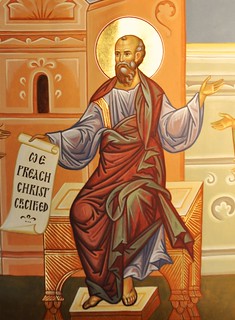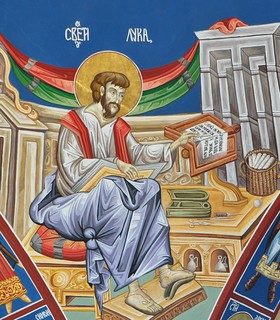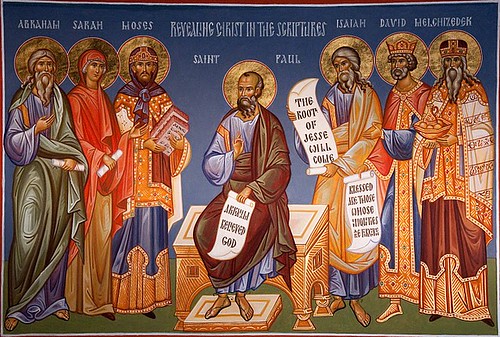This is the second blog in this series which is looking at passages from the New Testament which help shape the way we read and interpret not only the Old Testament but all of our Scriptures. The first blog is The Scriptures Bear Witness to the Word of God.

As is clear in the Gospels, the Evangelists believed the Jewish Scriptures bear witness to and like signs point to Jesus of Nazareth as being the Messiah. As we saw in the previous blog, both St. Luke (24:25-46) and St. John (5:37-47) have passages in which Jesus Himself says that Moses wrote in the Torah prophetically about Jesus as the Messiah. Jesus teaches His disciples that the Jewish Scriptures are to be read Christocentrically or Christologically, meaning they are to be read through the lens of the Christ/Messiah because that is the main purpose of these sacred writings. The witness of these Scriptures is not so much a history lesson as a prophecy about the Messiah. While the Jews believed the main purpose of the Torah was to give them God’s instruction/law, Jesus says their real purpose and correct interpretation is in revealing the Messiah. To fully understand the Old Testament, one has to know the Christ. It is in this sense that Christ fulfills the Old Testament and thus gives the Jewish Scriptures their full meaning. Christ is the fulfillment of the Jewish Scriptures, the one who gives meaning to them, and the one who properly interprets them. The main point of the Torah is thus not Law but revelation about God and about God’s Messiah.

The disciples of Christ came to believe that Jesus’ claims about Himself and about the Jewish Scriptures were true. The first disciples went forth into the world with the message that Christ fulfills the Scriptures which proves Jesus is in fact the Messiah. St. Paul says the tradition he has received is clear:
“For I delivered to you as of first importance what I also received, that Christ died for our sins in accordance with the scriptures, that he was buried, that he was raised on the third day in accordance with the scriptures…” (1 Corinthians 15:3-4)
Though the purpose of the Tanakh was to prepare the Jews for the coming of the Messiah, it turns out they were a people unprepared with eyes that could not see and ears that could not hear.
With them indeed is fulfilled the prophecy of Isaiah which says:
‘You shall indeed hear but never understand,
and you shall indeed see but never perceive.
For this people’s heart has grown dull,
and their ears are heavy of hearing,
and their eyes they have closed,
lest they should perceive with their eyes,
and hear with their ears,
and understand with their heart,
and turn for me to heal them.’(Matthew 13:14-16; see also: John 12:39-41; Acts 28:26-27)
So too, the disciples did not spontaneously or immediately make the connection between Jesus and the prophecies of the Jewish Scriptures. They did not embrace a blind faith or even a faith at first sight. It took them time to reflect on the life and teachings of Jesus of Nazareth, and only after His death and resurrection did they begin to form a clear understanding of who Jesus is and what the Scriptures say about the Messiah.
 So they took branches of palm trees and went out to meet him, crying, “Hosanna! Blessed is he who comes in the name of the Lord, even the King of Israel!” And Jesus found a young ass and sat upon it; as it is written, “Fear not, daughter of Zion; behold, your king is coming, sitting on an ass’s colt!” His disciples did not understand this at first; but when Jesus was glorified, then they remembered that this had been written of him and had been done to him. (John 12:13-16)
So they took branches of palm trees and went out to meet him, crying, “Hosanna! Blessed is he who comes in the name of the Lord, even the King of Israel!” And Jesus found a young ass and sat upon it; as it is written, “Fear not, daughter of Zion; behold, your king is coming, sitting on an ass’s colt!” His disciples did not understand this at first; but when Jesus was glorified, then they remembered that this had been written of him and had been done to him. (John 12:13-16)
In some cases it was years after the death and resurrection of the Lord Jesus that the disciples came to fully understand and appreciate what He had done and how the Scriptures of the Jews had in fact pointed to Him. That the Jewish Scriptures bore witness to Jesus Christ, they had no doubt. Paul the convert to Christianity, became convinced that what happened to Jesus was completely foretold in the Jewish scriptures.
And Paul went in, as was his custom, and for three weeks he argued with them from the scriptures, explaining and proving that it was necessary for the Christ to suffer and to rise from the dead, and saying, “This Jesus, whom I proclaim to you, is the Christ.” (Acts 17:2-3)
Not only Paul but other Jews also became convinced that Jesus was the fulfillment of what God had promised and they believed they could prove this from their sacred texts.
Now a Jew named Apollos, a native of Alexandria, came to Ephesus. He was an eloquent man, well versed in the scriptures. He had been instructed in the way of the Lord; and being fervent in spirit, he spoke and taught accurately the things concerning Jesus, though he knew only the baptism of John. He began to speak boldly in the synagogue; but when Priscilla and Aquila heard him, they took him and expounded to him the way of God more accurately. And when he wished to cross to Achaia, the brethren encouraged him, and wrote to the disciples to receive him. When he arrived, he greatly helped those who through grace had believed, for he powerfully confuted the Jews in public, showing by the scriptures that the Christ was Jesus. (Acts 18:24-28)
Unfortunately they did not record exactly to what passages they referred in order to prove that Jesus is the Messiah. We do find scattered throughout the New Testament various quotes from the Old Testament as well as echoes of or references to various Old Testament passages. How well these prove today or proved in the First Century that Jesus is the Messiah is debated. And though the New Testament expresses that the Jewish Scriptures clearly make reference to the suffering Messiah and his resurrection, today we realize we have to be willing to read those texts Christologically in order to come to the same conclusions. The texts by themselves are not absolutely and unambiguously clear that they refer to Jesus or prove what the Messiah is to be like. There was in Jesus’s day a fair amount of disagreement among Jews as to what the Messiah meant or would be.
Not only do the apostles themselves make claim that they can prove from Scripture that Jesus is the Messiah, but their Jewish listeners were able to examine these claims themselves and some were convinced from Scripture by these claims. Those Jews hearing the Gospel had to decide for themselves whether in fact the Scriptures made the claims the Christians were making and whether Jesus in fact fulfilled the prophecies. This reading of the Scriptures required deciding which texts are the prophecies, for obviously when it comes to the Torah, it could be read as mostly history or law and not at all as prophecy. For many Jews the Torah of Moses was essential for teaching them how to live their daily lives rather than being prophecy about a future Messiah. Those Jews who focused most exclusively on the Torah as Scripture, the Sadducees, seem to have had little interest in a Messiah or the resurrection or some life in a world to come. Jesus tried to convince them that they were reading the Scriptures incorrectly.
But some Jews were intrigued by the claims of the first Christians and did take the time to see if the Scriptures could be read the way Christ taught and whether the sacred texts did in fact prove that the Messiah had come in Jesus.
“The brethren immediately sent Paul and Silas away by night to Beroea; and when they arrived they went into the Jewish synagogue. Now these Jews were more noble than those in Thessalonica, for they received the word with all eagerness, examining the scriptures daily to see if these things were so.” (Acts 17:10-11)
Having the Scriptures, the oracles of God is not enough to ensure their proper interpretation. This is where Jesus debated with the other rabbis of His time. We will return to this in a future blog.

As an aside, though the four Gospels do quote the Old Testament and see a fulfillment of the prophecies, it is interesting that in those particular Gospel passages dealing with the purpose of the Gospels, they do not specifically claim to prove from the Jewish Scriptures that Jesus is Christ. St. Luke in 1:1-4 says his purpose in writing is “that you may know the truth concerning the things of which you have been informed.” He seems to be more focused on the life of Christ and what the events of Christ’s life show than on what the Jewish Scriptures prove about the Christ. Christ’s activities and actions prove who He is more than the Old Testament really does. John in his Gospel says he wrote what he did that we might believe that Jesus is the Christ (John 20:30-31), but again the focus is on what Jesus did more than what can be proved from the Old Testament. The deeds of Christ are the signs of who He is and offer proof of His claims. So while St. Paul in his epistles and the Acts of the Apostles do claim to be able to prove from the Scriptures that the Messiah had to suffer and die and that Jesus, the suffering, crucified and risen Jew, is the Messiah, the Gospels themselves use the Old Testament more to show that the events of Christ’s life were foretold which makes them more significant but the Evangelists seem to rely more on Jesus’s deeds, signs and teachings as the proof about His being the Christ and ushering into the world the Kingdom of God.

